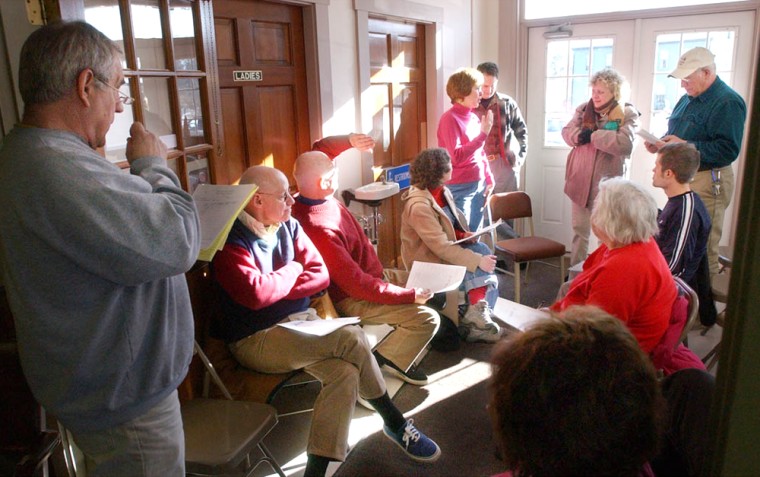John Kerry coasted to victory in the Maine caucuses Sunday, wrapping up a three-state weekend sweep that pushed the Democratic front-runner closer to the party nomination than any of his vanquished rivals.
Howard Dean, who campaigned in Maine Sunday, finished a distant second in yet another disappointment for the one-time front-runner, and Rep. Dennis Kucinich of Ohio was third in one of his better showings of the primary season.
The Massachusetts senator tacked the Maine win onto resounding victories in Michigan and Washington state on Saturday for a record of 10 wins in 12 contests and, more important, a substantial chunk of the delegates needed to secure the nomination.
With around 50 percent of the statewide vote, Kerry had 45 percent, Dean 26 percent and Kucinich 15 percent. John Edwards and Wesley Clark, who had focused on other states, had 9 percent and 4 percent.
“Today, the voters of Maine have sent a message that George Bush’s days are numbered and change is coming to America,” Kerry said in a statement in which he said he was “truly honored and humbled” by the confidence of the state voters.
Kerry has more than twice as many delegates as his closest pursuer, as his win in Maine pushed his total to 426 compared to Dean’s 184, according to an Associated Press tally. It takes 2,162 delegates to win the nomination. Kucinich appeared to fall just short of qualifying for delegates in Maine, which had 24 at stake.
For rivals, demoralizing
Kerry’s winning streak is beginning to demoralize his opponents. Aides to both Clark and Edwards said they expect their candidates to lose Tuesday when Virginia and Tennessee hold their primaries, the first all-Southern slate of the primary race.
Clark and Edwards, who promised on Sunday to forge ahead despite Kerry’s increasing advantage, are counting on a showdown in Wisconsin, where the front-runner will face withering attacks from all his rivals with the potential for a slip-up by the leader.
Kerry, campaigning like a front-runner Sunday, ignored his primary opponents and criticized President Bush on Iraq. He also picked up critical backing from Virginia Gov. Mark Warner.
Clark, Dean and Edwards, appearing separately on the Sunday television talk shows, all said they would continue to challenge Kerry for the Democratic nomination despite the Massachusetts senator’s advantage in the polls and in endorsements.
“Real voters are going to decide who the nominee is,” Dean said on CNN’s “Late Edition.”
Dean, the former front-runner and winless since the start of voting, declined in separate interviews to repeat his earlier assertion that he would withdraw from the race if he lost the Feb. 17 Wisconsin primary.
Both Clark and Edwards said they expected to run well in the next three primaries — Virginia and Tennessee on Tuesday and Wisconsin — but would remain in the race regardless.
Clark, en route to a jobs forum in Racine, Wis., said on CNN that he would run at least through the March 2 “Super Tuesday” primaries, including in California, Ohio and New York.
“We’ve got a lot of support across this country,” said Clark, a retired Army general. “We do expect to go on and do expect to be there on Super Tuesday.”
Edwards noted on “Fox News Sunday” that some 75 percent of delegates to the Democratic National Convention will still be up for grabs after Wisconsin votes.
“I view this very much as a long-term process, and we’re in this for the long term,” said the North Carolina senator, who visited Baptist churches in Richmond, Va., before attending a Democratic dinner in Nashville, Tenn., that Clark also planned to attend.
American Research Group polls give Kerry sizable leads in all three states: 11 points over Edwards and 12 over Clark in Tennessee; 13 points over Edwards and 18 over Clark in Virginia; and 26 points over Clark and 31 over Edwards in Wisconsin. The margin of error in each poll taken last week was plus or minus 4 points.
Kerry also has more than twice as many delegates as his closest pursuer, with 411 to Dean’s 175, according to an Associated Press tally prior to allocation of Maine’s delegates. It takes 2,162 delegates to win the nomination.
Accepting Warner’s endorsement in Richmond, Kerry said Bush had not fully answered questions about whether he fulfilled his National Guard service in Alabama during the Vietnam War.
Bush interview
“The issue here is, as I have heard it raised, is was he present and active in Alabama at the time he was supposed to be,” said Kerry, a decorated Vietnam War veteran. “I don’t have the answer to that question and just because you get an honorable discharge does not in fact answer that question.”
In an exclusive interview with NBC’s “Meet the Press,” Bush said he reported for duty and that his critics were wrong.
“I served in the National Guard. I flew F-102 aircraft. I got an honorable discharge,” Bush said. “I’ve heard this — I’ve heard this ever since I started running for office. I put in my time, proudly so.”
Kerry, who watched Bush’s interview with Warner at the governor’s mansion, also took issue with Bush for saying that deposed Iraqi leader Saddam Hussein had the ability to make deadly weapons.
“This is a far cry from what the president and his administration told the people in 2002,” he said.
Former chief U.S. weapons inspector David Kay has said he does not believe Iraq had the weapons of mass destruction Bush cited as the main reason for going to war.
Ahead of Tuesday’s Virginia primary, the Rev. Al Sharpton took the pulpit Sunday at a black church in Richmond, pledging to remain in the presidential race and urging worshippers to vote for the candidate who represents their views, not who they think has the best chance of winning.
